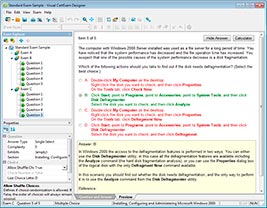Download Implementing Cisco Service Provider VPN Services.300-515.VCEplus.2021-12-30.57q.vcex
| Vendor: | Cisco |
| Exam Code: | 300-515 |
| Exam Name: | Implementing Cisco Service Provider VPN Services |
| Date: | Dec 30, 2021 |
| File Size: | 2 MB |
How to open VCEX files?
Files with VCEX extension can be opened by ProfExam Simulator.
Discount: 20%
Demo Questions
Question 1
Which utility can you use to validate an LSP in an MPLS environment?
- uRPF
- MPLS LSP ping
- logging
- RSVP
Correct answer: B
Question 2
What is the primary function of aVRF on a router?
- It enables the router to support multiple separate routing tables, which allows the device to handle overlapping IP addresses.
- It enables a router to run BGP and a distance vector routing protocol at the same time, which allows it to serve as a VPN endpoint between remote sites.
- It enables a router to configure VLANs locally, which provides segregation between networks.
- It enables the router to provide faster switching through the network by using labels to identify the input and output interfaces for neighbor routers.
Correct answer: A
Question 3
Which two statements describe primary differences between MPLS Layer 2 and Layer 3 VPNs?(Choose two.)
- Layer 2 VPNs use IPsec tunneling, but Layer 3 VPNs use L2TPv3 tunneling.
- Layer 2 VPNs use AToM, but Layer 3 VPNs use MPLS/BGP.
- Layer 2 VPNs use BGP, but Layer 3 VPNs use VPLS.
- Layer 2 VPNs use L2TPv3 tunneling, but Layer 3 VPNs use GRE tunneling.
- Layer 2 VPNs use IPsec tunneling, but Layer 3 VPNs use pseudowires to provide tunneling.
Correct answer: BD
Question 4

Refer to the exhibit. A network engineer has been called to configure the four PE devices in order to enable full communication among the four CE devices connected to them. While starting to configure, he experienced a connectivity issue.
Which two tasks should the engineer perform in order to begin the process correctly? (Choose two.)
- Configure PE3 to export route-targets 100:1 and 200:2.
- Configure PE3 to import route-targets 100:1 and 200:2.
- Configure PE4 to import route-targets 101:1 and 202:2.
- Configure PE2 to export route-targets 300:3 and 400:4.
- Configure PE1 to import route-targets 300:3 and 400:4.
Correct answer: AB
Explanation:
Question 5

Refer to the exhibit. If the two devices are operating normally, which two conclusions can you draw from this configuration? (Choose two.)
- CE1 must use OSPF to establish a neighbor relationship with PE1.
- PE1 labels the routes it learns from CE1 with the route-target 222:2 and shares them with its VPNv4 peers.
- PE1 labels the routes it learns from CE1 with the route-target 111:1 and shares them with its VPNv4 peers.
- The PE-CE routes between the devices are being exchanged by OSPF
- CE1 is supporting CSC.
Correct answer: AD
Question 6
Which two frames can be configured on an Ethernet flow point?(Choose two.)
- of a specific VLAN
- with different type of service values
- with identical type of service value
- with different class of service values
- with no tags
Correct answer: AE
Explanation:
Reference: https://www.cisco.com/c/en/us/td/docs/ios-xml/ios/cether/configuration/xe-3s/asr903/16-5-1/b-ce-xe-16-5-asr900/trunk-efp-support.html Reference: https://www.cisco.com/c/en/us/td/docs/ios-xml/ios/cether/configuration/xe-3s/asr903/16-5-1/b-ce-xe-16-5-asr900/trunk-efp-support.html
Question 7
In an Ethernet Virtual Circuit environment, which restriction do bridge domains have whenSTP is running?
- The STP mode must be RSTP or PVST+
- Bridge domains must be mapped to a different VLAN.
- The STP mode must be MSTP
- Bridge domains must belong to different MST instances.
Correct answer: C
Explanation:
Reference: https://www.cisco.com/c/en/us/td/docs/routers/asr920/configuration/guide/ce/b_ce_xe-313s-asr920-book/b_ce_xe-313s-asr920-book_chapter_01.html#reference_770349446ED24E83821EF701DDC46BFD Reference: https://www.cisco.com/c/en/us/td/docs/routers/asr920/configuration/guide/ce/b_ce_xe-313s-asr920-book/b_ce_xe-313s-asr920-book_chapter_01.html#reference_770349446ED24E83821EF701DDC46BFD
Question 8

Refer to the exhibit. An engineer is implementing an MPLS P2MP TE solution. Which type of router can serve as the midpoint router and the tailend router in this P2MP TE network implementation?
- headend
- source
- transit
- bud
Correct answer: D
Explanation:
Reference: https://www.cisco.com/c/en/us/td/docs/routers/asr920/configuration/guide/mpls/mp-te-path-setup-xe-3s-asr920-book/mp-te-path-setup-xe-3s-asr920-book_chapter_01.html Reference: https://www.cisco.com/c/en/us/td/docs/routers/asr920/configuration/guide/mpls/mp-te-path-setup-xe-3s-asr920-book/mp-te-path-setup-xe-3s-asr920-book_chapter_01.html
Question 9
An engineer is investigating an EVPN traffic flow issue. Which type of traffic should the engineer allow in an EVPN Tree Service in order to fix this issue?
- known unicast from a leaf to another leaf
- unknown unicast from a leaf to another leaf
- multicast from a leaf to another leaf
- known unicast from a root to another root
Correct answer: D
Explanation:
Reference: https://tools.ietf.org/html/draft-ietf-bess-evpn-etree-14 Reference: https://tools.ietf.org/html/draft-ietf-bess-evpn-etree-14
Question 10
An engineer is investigating an MPLS LDP issue. Which command should an engineer use on a Cisco IOS XE device to display the contents of the LFIB?
- show mpls forwarding-table
- show mpls ldp neighbors
- show mpls ldp labels
- show mpls ldp bindings
Correct answer: A
Explanation:
Reference: https://www.cisco.com/c/en/us/td/docs/ios-xml/ios/mpls/command/mp-cr-book/mp-s2.html Reference: https://www.cisco.com/c/en/us/td/docs/ios-xml/ios/mpls/command/mp-cr-book/mp-s2.html
HOW TO OPEN VCE FILES
Use VCE Exam Simulator to open VCE files

HOW TO OPEN VCEX AND EXAM FILES
Use ProfExam Simulator to open VCEX and EXAM files


ProfExam at a 20% markdown
You have the opportunity to purchase ProfExam at a 20% reduced price
Get Now!



